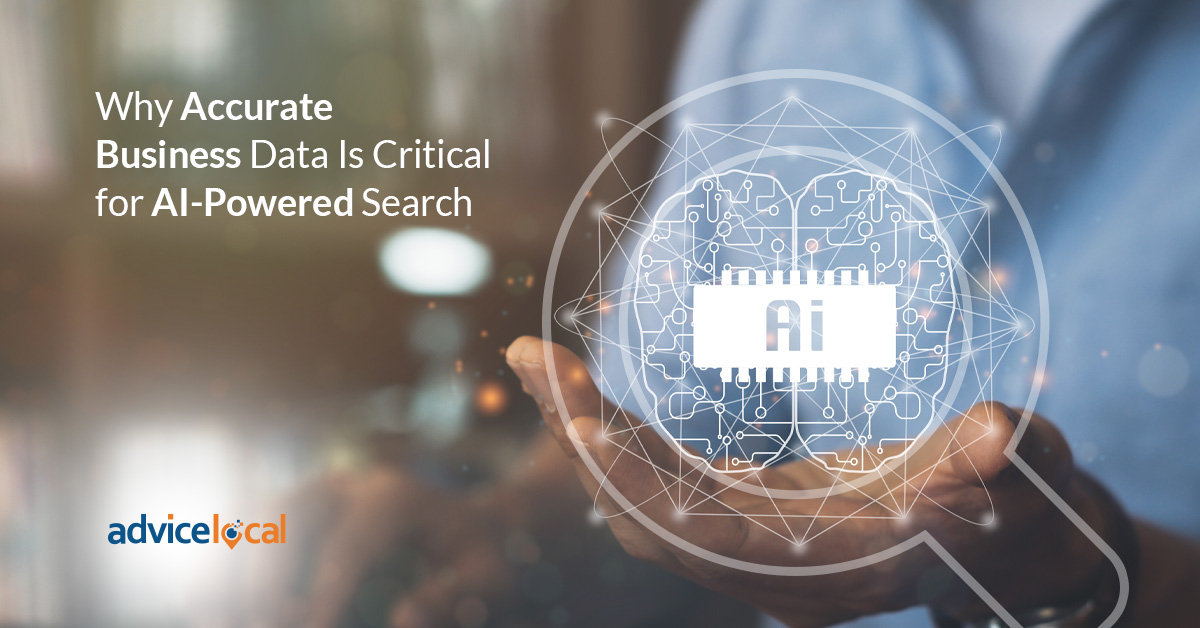In the coming years AI will shape almost every aspect of local business marketing, from listing management services and review monitoring to data analysis and voice search optimization. This transformation offers a huge opportunity for agencies willing to embrace new strategies. We’re already seeing changes in both user behavior and the integration of AI with Google’s search results. But what role will accurate business data play for local business discoverability?
The Importance of Good Business Data for AI
Many agencies and businesses (particularly those that rely on search engine traffic to reach customers) are concerned about how AI might affect this ability to reach customers. Actually, proactive local businesses can leverage AI to connect with their ideal audience more efficiently.
But is this optimism warranted? We believe so, and it stems from the fact that AI learns from data sources across the web, including business directories, social media, web scraping and user-generated content. By publishing specific data relevant to local businesses – location, hours, services, payment options, attributes, customer reviews and so on – you can become a key reference point for AI-generated searches. The more accurate and consistent the data, the better the chances of appearing in relevant search results.
Increasing Discoverability With Local Business Data Distribution
As a leading listing management provider, Advice Local submits local business data around the web. Over the years we have helped many clients recover lost search placements resulting from inconsistent data by implementing better data monitoring and distribution. By ensuring consistent, accurate data across multiple platforms, businesses can improve their visibility in AI-generated search results, as AI learns from these various data sources.
A recent post from Yext summarizes how this focus on accurate business data will only increase going forward. The post points out that AI tools gather data from many platforms, and are more likely to cite sources like Yellow Pages or Localmint over Google or Bing.
In addition, as AI models are refined you can expect concepts similar to Google’s EEAT (experience, expertise, authoritativeness and trustworthiness) to be commonplace anywhere consumers search for local business information.
Future-Proofing a Local Business for AI Search
So, how can you ensure that your clients will be prepared for changes like Google’s AI Overview and others that are certain to follow?
Consider Search Intent
The attributes associated with a business will likely take even greater priority in AI-generated search results. For example, searching for “family-friendly restaurant” will generate precise results based on keywords from diverse sources like the website, customer reviews and directories. Look to integrate attributes across various sources to better match search intent.
Distribute Data Widely
The Yext post also revealed an analysis showing that brands that synced data with over 75% of their network received a 186% increase in web traffic, compared with those syncing with less than 50%. Distributing data widely is a strategy that works now and will continue to work, as AI relies on a network of sources. See our Data Amplifier Network for an example of a powerful network.
Create a Review Strategy
Review sentiment will help determine if a business is the best option for a particular search query. For example, receiving many reviews referencing low cost could help if a user searches for “affordable hotel near me.” Encouraging and managing customer reviews can provide valuable data for AI to learn from and therefore improve visibility for relevant searches.
We Distribute Accurate Data to Business Listing Platforms That AI Trusts
Advice Local can help you maintain accurate and consistent business data across many quality listing platforms. Our dashboard solution will ensure you stay on top of AI listing results and the changing nature of local search marketing. Call (214) 310-1356 or request a demo.




![Epic Guide to Local SEO Download [ad]](https://www.advicelocal.com/images/epic-guide-local-SEO-download-cta.png)